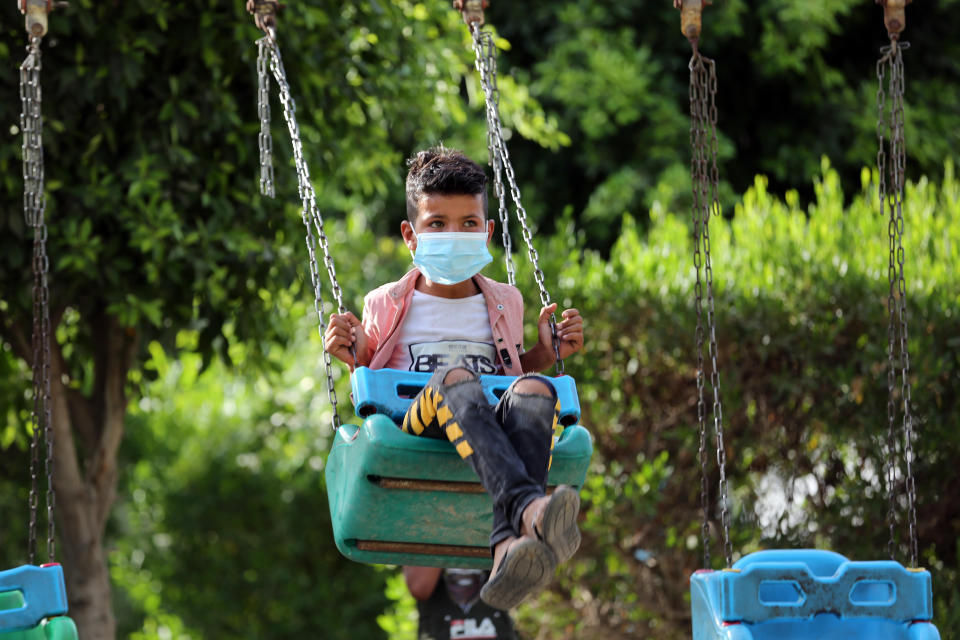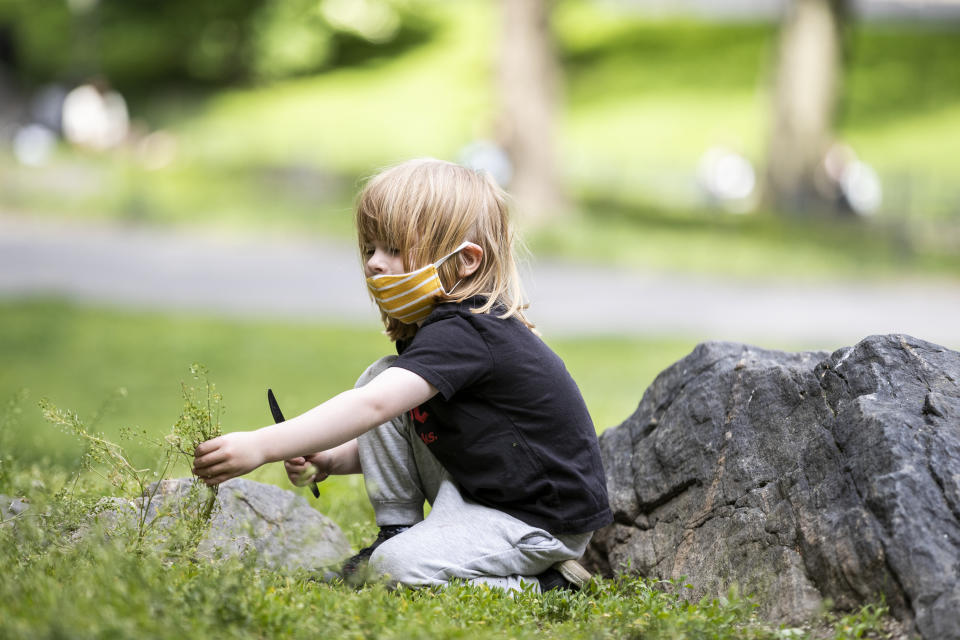Coronavirus: Independent Sage suggests vacant wedding venues be used as outdoor classrooms

A member of the Independent Scientific Advisory Group for Emergencies (Sage) has suggested vacant wedding venues could be transformed into socially-distant classrooms.
Schools across the UK rang their last bell in March, forcing many parents to take on the role of teacher.
As government officials work to ease the lockdown, it has been suggested certain primary school students in England could be back in the classroom on 1 June.
Experts have warned, however, that while healthy children are at low risk of coronavirus complications, they could spread the infection to vulnerable relatives.
To combat this, Independent Sage has suggested teachers make use of the “glorious weather” by holding outdoor lessons, where the odds of transmission is reduced.
Vacant summer camps, football stadiums and even wedding venues have been suggested as viable “classrooms”.
Early research suggests the coronavirus is mild in four out of five cases, however, it can trigger a respiratory disease called COVID-19.

Outdoor learning an ‘enjoyable experience for children’
Concerns have been raised lockdown is forcing children to miss out on an education.
This may be particularly true for those from deprived areas, who often lack the resources to take part in “virtual lessons”.
Sending youngsters back to school, however, increases person-to-person mixing, which could trigger a dreaded second peak.
To combat this, Independent Sage has recommended outdoor lessons.
“Out of school provisions need to be increased,” said Dr Zubaida Haque, Independent Sage member and interim director of the Runnymede Trust think tank.
“We need to be creative about using private land, football stadiums [and] private school fields to get more education for children who are not in school.
“We’ve had glorious weather; [there’s] no reason we can’t have outdoor classrooms under marquees and in sport facilities.
“We know being outside and having more ventilation reduces the risk of COVID-19.”
Independent Sage was formed to provide a “constructive” alternative to the official Sage team, which has come under fire for a lack of transparency over the advice it gives Number 10.
Government officials have stressed transmission most commonly occurs in confined settings, like homes.
Relaxed restrictions therefore allow people in England to exercise outdoors as much as they wish and meet up with one person from outside their household, providing social distancing is maintained.
As well as giving youngsters an education, outdoor classrooms may also make them eager to learn as we adjust to a “new normal”.
“[The UK has a] long standing tradition in [the] use of outdoor schools to improve the health of children,” said Independent Sage member Professor Gabriel Scally, from the Royal Society of Medicine.
“It’s a wonderful opportunity to reinvent that, particularly as we go into summer months.”
Professor Scally added how the “stay at home” restriction has created many empty “classrooms”.
“Lots of venues are not being used for other things, like weddings,” he said.
The perks of being outside may also extend beyond learning.
“We know the therapeutic benefits of being in green space and the physical opportunities [it brings],” said Professor Scally.
“[Let’s] take over green spaces, take over temporary buildings.
“It will make for an enjoyable experience for children coming out of this time.”
In its report, Independent Sage cites Denmark, where officials successfully opened schools “relatively early” in the outbreak.
“Stringent measures” include limiting classes sizes to just 10 or 11 and holding lessons outdoors.
Denmark reportedly allows indoor teaching if the weather is poor, but the majority of lessons – and staff meetings – take place outside.
Independent Sage suggested the 750,000 people who offered to volunteer for the NHS could help get outdoor lessons up and running.
Scout leaders and sports coaches could also be of assistance, it added.
Schools don’t operate in a vacuum
Based on existing school set-ups, Independent Sage has warned it may not be safe for them to reopen on 1 June.
“The risk to children is very small, but schools don’t operate in a vacuum”, said Dr Haque. “They are embedded in communities.
“We have to think of the impact on teachers, parents, grandparents”.
Independent Sage is arguing for the opening of schools to be considered on a “case-by-case basis” using local real-time data.
It has criticised the government for its “top-down decision-making”, rather than involving local authorities.
The NHS launched its test, trace and isolate system in England and Scotland on Thursday.
In a bid to get out of the blanket lockdown, anyone with coronavirus symptoms has been told to request a test.
If it comes back positive, a contact-tracing team gets in touch to discuss who the patient has been close to and where they have been.
Contacts deemed at risk of catching the virus will be emailed or texted with instructions to go into isolation for 14 days, whether they have symptoms or not.
Government officials have warned the system will not be perfect right away, but should improve over time.
Sir David Anthony King, chair of Independent Sage and former chief scientific adviser, said: “We want to see it tested for at least a couple of weeks [before opening schools].”
Professor Anthony Costello, from University College London (UCL), also stressed the importance of involving local authorities in the tracing.
“If you get rung by some person whose being trained for a few hours in a call centre 200 miles away - are you going to isolate for 14 days?,” he said.

Coronavirus: Are children at risk?
The vast majority of coronavirus deaths worldwide have occurred in the elderly or those with pre-existing medical conditions.
A recent study review by UCL concluded youngsters are around half as likely to catch the infection as adults, let alone become seriously ill.
This contradicts deputy chief medical officer Professor Jonathan Van Tam, who said at Monday’s press briefing: “Ongoing UK data and international data suggest children are in fact as likely as adults to become infected and carry the virus”.
The UCL team could not conclude whether infected children pass the coronavirus on as readily as older people.
Concerns were raised when NHS doctors were told to look out for “multi-system inflammation” after a handful of children ended up in hospital with life-threatening symptoms.
Medics have likened this to Kawasaki disease, which is thought to come about when the immune system over-reacts to an infection.
When asked if it is “safe” to open schools during a Science Media Centre briefing, Professor Russell Viner – lead author of the UCL paper – previously said: “There are safety issues in walking out the front door, there are safety issues getting in our car to drive our children to school.
“We must recognise this virus is with us and restart our lives in a way that balances safety with benefit.
“What we can do is partition risks.”
It has been suggested groups of children could attend school at different times, have socially-distant breaks or sit further apart at their desks.
UCL scientist Professor Chris Bonell admitted we do not know how effective any of these measures will be at combatting the coronavirus outbreak, but added they may act “synergistically”.

What is the coronavirus?
The coronavirus is one of seven strains of a virus class that are known to infect humans.
Others cause everything from the common cold to severe acute respiratory syndrome (Sars), which killed 774 people during its 2002/3 outbreak.
Since the coronavirus outbreak was identified, more than 5.7 million cases have been confirmed worldwide, according to Johns Hopkins University.
Of these cases, over 2.3 million are known to have “recovered”.
Globally, the death toll has exceeded 356,200.
The coronavirus mainly spreads face to face via infected droplets expelled in a cough or sneeze.
There is also evidence it is transmitted in faeces and can survive on surfaces.
Symptoms include fever, cough, fatigue, slight breathlessness and a loss of smell or taste.
The coronavirus has no “set” treatment, with most patients naturally fighting off the infection.
Those requiring hospitalisation are given “supportive care”, like ventilation, while their immune system gets to work.
Officials urge people ward off infection by washing their hands regularly and maintaining social distancing.
Coronavirus: what happened today
Click here to sign up to the latest news, advice and information with our daily Catch-up newsletter
Read more about COVID-19
How to get a coronavirus test if you have symptoms
What you can and can’t do under lockdown rules
In pictures: How UK school classrooms could look in new normal
How public transport could look after lockdown
How our public spaces will change in the future
Help and advice
Read the full list of official FAQs here
10 tips from the NHS to help deal with anxiety
What to do if you think you have symptoms
How to get help if you've been furloughed

 Yahoo News
Yahoo News 

